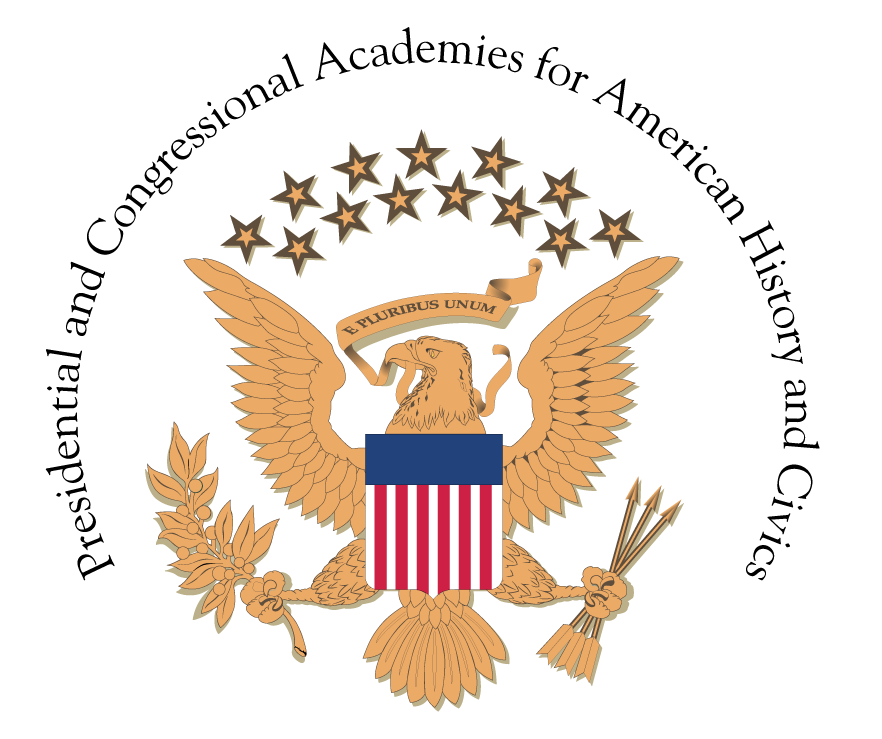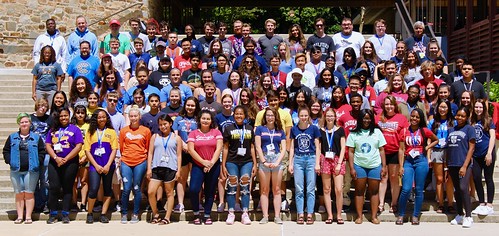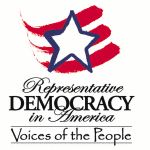Previous Programs
American History and Civics Academies

This academy is a grand slam from the students' perspective and the teachers' perspective! The dynamic taking place between the teachers and between the students and all the combinations thereof has made for and continues to make for the most powerful, engaging, and valuable seminar that I have been to in my thirty-year career.
—Presidential Academy participant
The Center's free American History and Civic Academies provided teachers and students with high-quality educational engagement. The experience significantly enhanced students' civic dispositions related to political interest and attention, political discussion, community engagement, government service, civic duty, and trust in government. Research from the Civic Education Research Lab at Georgetown University demonstrates that students' knowledge of history and civics improved, especially among Title I school students. Keep reading to learn more about this program.
Program Information
What Were the Presidential and Congressional Academies?
The Presidential Academy for secondary school teachers and the Congressional Academy for high-need students immersed participants in the study of constitutional history and principles following the intellectual framework of the We the People: The Citizen and the Constitution curriculum.
The Academies began with a summer institute in conjunction with exemplary scholars and mentor teachers, as can be seen in the 2019 Presidential Academy agenda and the 2019 Congressional Academy agenda. Academies participants also had the opportunity to collaborate with their peers and participate in highly interactive discussions and activities, including a simulated congressional hearing. Learning was enhanced with virtual field trips to National Park Service and other historical sites.
Engagement among teachers and students continued during the academic year following the initial institute. The Center also hosted online discussion forums for teachers and for students to continue peer conversation as they engage in history and civics activities at their schools. Four webinars were offered after the summer institute to extend the teachers' professional development and benefit students and the general public.
This opportunity was offered to students and teachers throughout the United States made possible with a grant from the U.S. Department of Education and matching funds.
What Scholars Participated in the Presidential Academy?
- The Honorable Susan Leeson, Associate Justice, Oregon Supreme Court (retired)
- Dr. Jack Barlow, Professor Political Science, Juniata College
- Dr. Francene Engel
- Dr. Vikram Amar, Dean, University of Illinois, College of Law
What Scholars Participated in the Congressional Academy?
- GlyptusAnn Grider-Jones, PR & Research Coordinator, McConnell Center
- Dr. Joseph Stewart, Professor of Political Science, Clemson University
- Christopher Riano, JD, President, Center for Civic Education
- Dr. David Hudson, Professor of Law, Belmont University
Who Participated?
This opportunity was for high school American history or civics teachers and high school students, going into eleventh or twelfth grade in the Fall of 2021. In order to meet grant priorities, preference was given to teachers who work with high-need students and student applicants who are high-need. Teachers were selected from secondary schools that offer strong administrative support for work with high-need students.
When Was the 2021 Institute?
The summer institute took place online from Monday, July 5 to Friday, July 23, 2021. It included numerous live sessions with scholars, mentor teachers, and peers as well as asynchronous academic work outside of the live sessions. In addition, Presidential Academy teachers had access to four hour-long follow-up webinars with scholars in August and September 2021.
What Did Participants Gain?
- Learning with exemplary history and political science scholars and mentor teachers
- Engagement in research, public speaking, and a congressional hearing simulation
- Interaction with peers from across the country
- Free virtual field trips to National Park Service and historical sites
- Free institute materials and a stipend
What Were the Expectations of Participation?
Presidential Academy teachers engaged with a rich community of teacher-scholars from throughout the United States. Teachers participated in the virtual three-week summer institute at the same time as Congressional Academy students, though the Presidential and Congressional Academy sessions were separate. After the summer institute, teachers engaged in online outreach and follow-up activities with scholars that will benefit their school communities. They participated in an online discussion forum and four online webinars. They engaged with other teachers and students at their schools to organize history and civics activities. An academic year “project” (deliverable) included—but was not limited to—a plan to conduct a simulated hearing in the classroom, adapting lessons and activities from the summer institute for your classroom, and providing aid to students who participated in the summer institute in their presentations to school and/or parent leaders.
They engaged with other teachers and students at their schools to organize history and civics activities. An academic year “project” (deliverable) included—but was not limited to—a plan to conduct a simulated hearing in the classroom, adapting lessons and activities from the summer institute for your classroom, and providing aid to students who participated in the summer institute in their presentations to school and/or parent leaders.
Congressional Academy student-scholars participated in a virtual three-week summer institute at the same time as participants in the Presidential Academy. They also engaged in follow-up activities during the school year and continued to interact with fellow participants in a student online discussion forum. Students worked with other students and teachers at their school to organize or participate in a history or civics activity. This included—but is not limited to—participating in the We the People program or National History Day, preparing a PowerPoint presentation to share with the class on the most interesting aspect of the Academy, preparing a presentation to share with the administration of the school and others at a school board meeting or a Parent-Teacher Association meeting, and helping their teacher prepare their classmates to take part in a congressional hearing.
What Costs were Covered?
The Academies were free for participants! The costs for the Academy were covered by the grant, in addition to generous donations received from throughout the country.
Contact
For additional information about the American History & Civics Academies, please contact Alissa Irion-Groth at irion@civiced.org.
Donate
To support future programs that provide teachers and students with a valuable and dynamic experience, consider donating through our donate page.

School Violence Prevention Demonstration Program
The Center for Civic Education's School Violence Prevention Demonstration Program (SVPDP) was a curriculum, training, and research program that provided students with opportunities to engage in high quality civic education and group participation exercises throughout the academic year. The program was designed to improve students' civic knowledge, skills, and attitudes. It provided training opportunities for teacher participants that supported the curriculum and emphasize critical thinking, cooperative learning, group problem-solving, and performance-based assessment. It also provided research and evaluation of changes in students' civic knowledge and attitudes as they relate to tolerance for the ideas of others; civic responsibility; authority and the law; and social and political institutions.
The program began in May 1999, when the Center was awarded a grant from the United States Department of Education to study ways in which civic values and principles might be used as a violence prevention tool. Research studies had demonstrated that excellent civic education programs, such as the Center's We the People program, could have positive effects on students' attitudes towards society. The program’s federal funding was eliminated in academic year of 2010-11. At the program’s end there were 26 active sites, 4 pilot sites, 13 inactive sites and over 1085 schools from across the country involved.
The professional development component of SVPDP was unique. A teacher received intensive staff development. The objective was to lend support to the teacher through the academic year. Teacher participants attended a minimum of fifty hours of professional development during the school year and incorporate the program curricular materials -- Foundations of Democracy, We the People, and Project Citizen -- into their regular social studies curriculum. Participants are expected to integrate 90-110 hours of program instruction and involve students in the culminating activities for Project Citizen and We the People Curriculum.
The professional development sessions are designed to help teachers:
- Integrate the three curricula
- Fold that curricula into the already existing scope and sequence
- Make connections between students’ behaviors and attitudes in class and the concept of violence prevention
- Help identify all the applicable local and state standards
- Prepare and conduct the required simulations
- Explore and practice various classroom methodologies
- Expand on the individual teachers’ content knowledge
- Share experiences of the program (both positive and negative)
- Work with a mentor whenever possible
- Work with other teachers in the same school building involved in SVPDP
The program has been implemented in grades four through twelve in large urban public school districts, rural school districts, private school districts, Indian Reservation schools and in some primary grades in response to local requests.
The Native American Initiative was an outreach effort of SVPDP The initiative’s goal was to provide civic education materials that are sensitive to and infused with the history, traditions, and cultures of the Native People.
An outgrowth of the SVPDP was curriculum material that is still in existence and continues to grow. These are listed here along with the links of where they can be found on our site.
Black History MonthWoman’s History Month
Constitution Day

Representative Democracy in America
Representative Democracy in America: Voices of the People (RDA) was a national project designed to reinvigorate and educate Americans on the critical relationship between government and the people it serves. The project introduces citizens, particularly young people, to the representatives, institutions, and processes that serve to realize the goal of a government of, by, and for the people.
The project was implemented by the Alliance for Representative Democracy, a collaborative effort of the Center for Civic Education, the Center on Congress at Indiana University and the National Conference of State Legislature. RDA provided innovative educational materials for K-12 classrooms, conducted the Campaign to Promote Civic Education, and informed the general public about representative democracy through a variety of media.
In July 2008, the Alliance launched a professional development initiative to promote the use of its extensive curricular programs in classrooms across the country. Included were the following videotaped speeches presented at the inaugural professional development meeting:
- Understanding Congress–Hon. Lee Hamilton, Director, Center on Congress at Indiana University (34 minutes)
- The Philosophical Foundations of Representative Democracy–Anthony Corrado, Charles A. Dana Professor of Government, Colby College
- The Informal Political Process–Thomas Mann, Senior Fellow, The Brookings Institution (26 minutes)
- The Role of the U.S. Senate–Donald Ritchie, Associate Historian, U.S. Senate (17 minutes)
- The Role of U.S. House of Representatives–Fred Beuttler, Deputy Historian, U.S. House of Representatives (20 minutes)
- The Role of State Legislatures–Alan Rosenthal, Professor of Political Science, Eagleton Institute of Politics, Rutgers University (28 minutes)
- Citizen Participation in State Legislatures–Hon. Rosie Berger, Wyoming State Representative (9 minutes)
- Citizen Participation in State Legislatures–Hon. Leticia Van de Putte, Texas State Senator (29 minutes)
- The Role of Education in a Representative Democracy–Margaret Branson, Associate Director, Center for Civic Education (34 minutes)
- (The videos are unedited, full-length versions of the speeches.)
The Center for Civic Education’s major activity in this project was a seven-part video series on DVD to help middle and high school students understand our system of representative democracy. This DVD is still available in the CCE store for purchase. The seven programs, each approximately 15 minutes in length, and the instructional guides address the following topics:
- the roots of representative democracy
- federalism and the separation of powers
- the roles of representatives, executives, and justices in our democracy
- our representatives and how they are chosen
- the role of the citizen in a representative democracy
- The roles available to non-voting age people.

Citizens, not Spectators
Citizens, Not Spectators was a non-partisan voter education program developed through a cooperative effort by the Center for Civic Education and the Arsalyn Program of Ludwick Family Foundation. It was a non-partisan voter education curriculum for elementary, middle and high school students.
The goal of Citizens, Not Spectators was to increase the voting rate among young Americans by providing engaging voter education to students in grades 4-12. To accomplish this goal, the curriculum demystified the voting process by teaching elementary, middle, and high school students how to cast a vote, how the voting process works, how to become an informed voter, and why it is important to cast an informed vote.
The curriculum focused on active learning. Using actual voter registration forms and ballots, students received instruction in how to register and cast a vote in a simulated election. Lessons from Citizens, Not Spectators were taught at any time, but were most effective when teaching about voting occurred around the time of actual federal, state, or local elections. The lessons have not been lost, they can be found here.
About the Arsalyn Program
The Arsalyn Program of Ludwick Family Foundation was created to encourage young Americans to become informed and active participants in the electoral process. Arsalyn views the civic and political engagement of young people as beneficial to country, community and character. Arsalyn is firmly committed to a non-partisan, non-issue-based and inclusive approach to ensure that voting becomes a lifetime commitment on the part of our nation's young adults.





